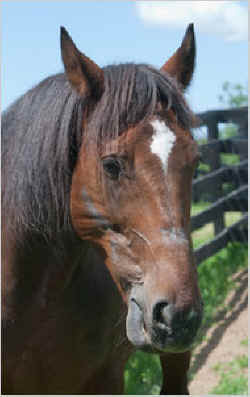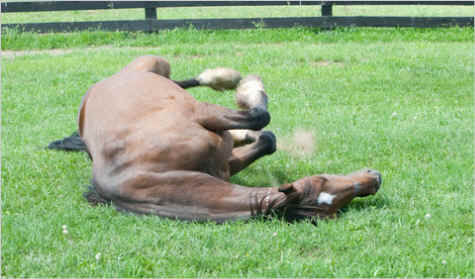
Billy: Carriage Horse to Sanctuary
Animal Stories from All-Creatures.org
From Friends of Animals and The Coalition to Ban Horse-Drawn Carriages
July 2010
What happens to the city’s carriage horses after they retire from clopping along the streets has long been a subject of mystery and contention?

Opponents of the carriage-horse industry claim that when horses get too old and infirm to work, stables routinely sell them at auctions frequented by meat buyers, effectively sending them off to their deaths. Stable owners say that, quite to the contrary, their horses are retired to farms to live out their lives in green splendor, or are occasionally sold to good homes.
Last week, horse rights advocates purchased a lame, long-toothed former carriage horse named Billy who had just been sold at an auction in New Holland, Pa., that many advocates say is often the last stop before the slaughterhouse. Billy had recently been retired from West Side Livery stables on West 38th Street.
The Coalition to Ban Horse-Drawn Carriages said it had saved Billy from slaughter, in a rare last-minute catch. Billy’s former owners, naturally, dispute this claim. Here is what we can tell you about Billy.
Billy, a bay gelding in his teens with a white forehead spot and feathered legs, had been working out of West Side Livery for six or seven years, said his owners there, Maria Sulla and Sebastian Spina.
About two months ago, Ms. Sulla said, she sent Billy to an Amish farm in Pennsylvania for rest, in accordance with a new city law requiring that horses get at least five weeks off a year in a place with access to paddock or pasture.
While Billy was away, the couple bought a younger horse named Rebecca.
“Because we found another horse — and for us, it’s better than Billy — instead of bringing Billy back, we told the farmer to sell him,” Ms. Sulla said.
“I didn’t want to put it in service anymore,” Mr. Spina said of Billy. “It was too old.”
Ms. Sulla said she figured Billy would be sold to an Amish farmer. Advocates have long complained that some Amish farmers work horses to the point of abuse. Ms. Sulla said the Amish “buy horses because they use them; they don’t kill them.”
Elizabeth Forel of the Coalition to Ban Horse-Drawn Carriages said Billy was sold at a regular Monday auction in New Holland, Pa., probably on June 21, to a broker.
Ms. Forel, one of several advocates who try to track the fate of retired carriage horses, learned about him from another advocate. His status as a former carriage horse was confirmed by a four-digit number -– 2873 -– engraved on his left front hoof.
Ms. Forel said she had only a few days before the broker who bought him — who buys horses at the auction in bulk — resold Billy, probably, given his age and condition, to a meat buyer to be trucked off to a slaughterhouse in Mexico or Canada (horse meat is popular in many countries). Ms. Forel declined to give the name of the broker, saying that to do so would damage relations with him and endanger future rescues.
The coalition and Friends of Animals put up $600 to buy Billy and about $900 to transport him from New Holland, where he was still being boarded, to the Equine Advocates sanctuary in Chatham, N.Y., not far from Albany. “Obviously it cost a lot,” said Edita Birnkrant, the New York director of Friends of Animals, “but it’s not a lot of money when you consider the life of the horse.”
Billy’s first stop was an equine hospital last Monday. A veterinarian found two kinds of worms and fairly serious lameness in his right front limb — “consistently head nodding lame,” the vet’s report said. Ms. Forel said Billy’s teeth had also been allowed to grow long and sharp –- horses need their teeth filed down from time to time or it becomes painful and difficult for them to eat. The vet estimated Billy’s age at 18; Ms. Sulla said he was 14.
MMs. Forel said that, as it happened, she had complained in February to the American Society for the Prevention of Cruelty to Animals, which monitors New York carriage horses, that Billy was being worked double shifts. Ms. Sulla denies the charge. “It never happened,” she said. The A.S.P.C.A. was unable to immediately determine the disposition of the complaint.
On Wednesday, Billy joined 80 other horses, ponies and mules at Equine Advocates. He has been renamed Bobby II and will spend the rest of his days roaming the farm’s 140 acres, said Susan Wagner, the sanctuary’s president.

“He’s already taken to his new environment,” she said by phone Friday. “I don’t think he’s ever gotten a chance to roll before. He got out on the grass and started to roll.”
Return to: Animal Stories







